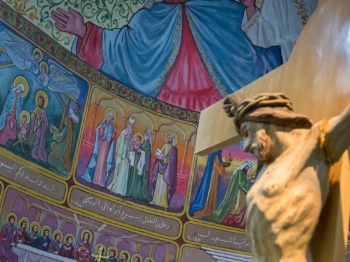Focus on Gaza
 The Latin Catholic Church of the Holy Family
The Latin Catholic Church of the Holy Family
In this short article, we publish the comments of the regional director for Palestine and Israel of the Catholic Near East Welfare Association following his visit to Gaza in early April. Unfortunately, this article predates the recent events in early May in which 30 people were killed, Palestinians and Israelis, due to the rockets launched from Gaza and Israel's subsequent air raids. These sad developments render ever more urgent the need to support the civil community that hopes for peace.
A few days before Easter and exactly one day after the elections in Israel, Joseph Hazboun, CNEWA regional director for Palestine and Israel visited Gaza. On his return from his visit of April 10 and 11 he relayed the following: "Unlike the Palestinian population in Israel, East Jerusalem and the West Bank which was particularly bitter about the outcome of the recent elections and the likelihood that Netanyahu will continue to lead the new government in Israel, I was surprised by the general sense of relief in the Gaza community. The reasoning in Gaza is that Netanyahu no longer has to prove himself to the Israeli public, which means that there is less risk of an imminent attack on Gaza.” Today, unfortunately, the situation is already different after the almost 30 victims in early May when rockets were fired from Gaza and Israel's reaction.
In the report released by the CNEWA, the director talks about the projects visited, the progress made and the funds still needed to ensure the proper functioning of some structures or to keep the population support programs active.
Hazboun tells of the future gradual opening of classes in the Holy Rosary Sisters’ school in Gaza, as well as the purchase of material for the workshops. The school will need additional funds for refurbishment of the kindergarten.
At Al-Ahli Arab Hospital, there are various ongoing projects: a work placement program that offers the possibility of not only finding work but also ongoing professional formation; a program for malnourished children; a special fund for poor and elderly Christians; and a program for the prevention and treatment of breast cancer. The hospital's desire is to be able to continue the work placement program without subtracting important human resources.
The Near East Council of Churches (NECC) was another of the institutions visited: for some time the NECC has been carrying out a psychosocial support project for mothers and children at three clinics and the need to continue investing in this field unfortunately remains.
Other meetings include one with the Arab Orthodox Cultural Center - which has received generous support from Saudi Arabia - and with Orthodox scouts (who together with their Catholic counterparts are promoters of shared programs). Young people were also protagonists of the subsequent Hazboun meeting with the YMCA, which is working on a micro-business project to create new jobs for 40-50 young people.
The last visit was to Father Mario da Silva, the pastor of the Latin Catholic Church of the Holy Family. The St. Thomas Aquinas Training Center, which offers courses for young Christians to increase their employment opportunities, is active in the parish but Father Mario would like to open new spaces to accommodate young Muslims, thus creating further opportunities for meeting and cooperation.
(May 2019)



